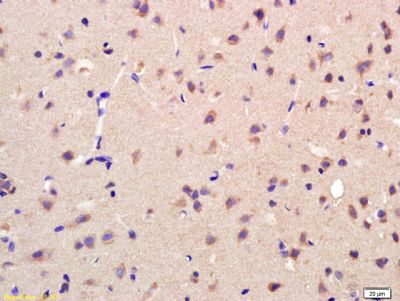产品货号 : mlR7953
英文名称 : AKR1A1/ALDR1
中文名称 : NADP依赖的乙醇脱氢酶抗体
别 名 : AK1A1_HUMAN; Akr1a1; Alcohol dehydrogenase [NADP+]; Alcohol dehydrogenase; Aldehyde reductase; aldo-keto reductase family 1 member A1 (aldehyde reductase); Aldo-keto reductase family 1 member A1; ALDR1; ALR.
研究领域 : 细胞生物 免疫学 信号转导
抗体来源 : Rabbit
克隆类型 : Polyclonal
交叉反应 : Human, Mouse, Rat, Pig, Cow, Horse, Rabbit,
产品应用 : WB=1:500-2000 ELISA=1:500-1000 IHC-P=1:400-800 IHC-F=1:400-800 IF=1:100-500 (石蜡切片需做抗原修复)
not yet tested in other applications.
optimal dilutions/concentrations should be determined by the end user.
分 子 量 : 36kDa
细胞定位 : 细胞浆 细胞膜 细胞外基质 分泌型蛋白
性 状 : Lyophilized or Liquid
浓 度 : 1mg/ml
免 疫 原 : KLH conjugated synthetic peptide derived from human AKR1A1:53-130/325
亚 型 : IgG
纯化方法 : affinity purified by Protein A
储 存 液 : 0.01M TBS(pH7.4) with 1% BSA, 0.03% Proclin300 and 50% Glycerol.
保存条件 : Store at -20 °C for one year. Avoid repeated freeze/thaw cycles. The lyophilized antibody is stable at room temperature for at least one month and for greater than a year when kept at -20°C. When reconstituted in sterile pH 7.4 0.01M PBS or diluent of antibody the antibody is stable for at least two weeks at 2-4 °C.
PubMed : PubMed
产品介绍 : Catalyzes the NADPH-dependent reduction of a variety of aromatic and aliphatic aldehydes to their corresponding alcohols. Catalyzes the reduction of mevaldate to mevalonic acid and of glyceraldehyde to glycerol. Has broad substrate specificity. In vitro substrates include succinic semialdehyde, 4-nitrobenzaldehyde, 1,2-naphthoquinone, methylglyoxal, and D-glucuronic acid. Plays a role in the activation of procarcinogens, such as polycyclic aromatic hydrocarbon trans-dihydrodiols, and in the metabolism of various xenobiotics and drugs, including the anthracyclines doxorubicin (DOX) and daunorubicin (DAUN).
Tissue specificity:Widely expressed. Highly expressed in kidney, salivary gland and liver. Detected in trachea, stomach, brain, lung, prostate, placenta, mammary gland, small intestine and lung.
Function:
Catalyzes the NADPH-dependent reduction of a variety of aromatic and aliphatic aldehydes to their corresponding alcohols. Catalyzes the reduction of mevaldate to mevalonic acid and of glyceraldehyde to glycerol. Has broad substrate specificity. In vitro substrates include succinic semialdehyde, 4-nitrobenzaldehyde, 1,2-naphthoquinone, methylglyoxal, and D-glucuronic acid. Plays a role in the activation of procarcinogens, such as polycyclic aromatic hydrocarbon trans-dihydrodiols, and in the metabolism of various xenobiotics and drugs, including the anthracyclines doxorubicin (DOX) and daunorubicin (DAUN).
Subunit:
Monomer.
Tissue Specificity:
Widely expressed. Highly expressed in kidney, salivary gland and liver. Detected in trachea, stomach, brain, lung, prostate, placenta, mammary gland, small intestine and lung.
Similarity:
Belongs to the aldo/keto reductase family.
SWISS:
P14550
Gene ID:
10327
Important Note:
This product as supplied is intended for research use only, not for use in human, therapeutic or diagnostic applications.
产品图片












